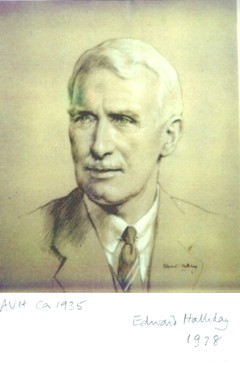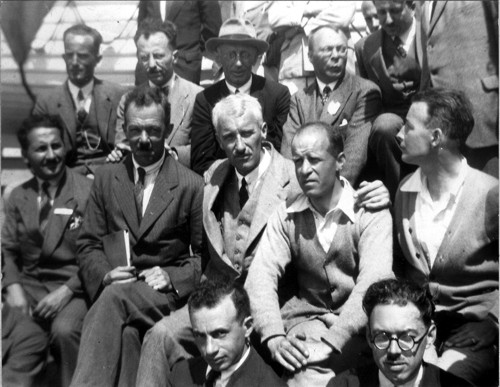|
One of my greatest scientific heros is A.V.Hill, and its one of my great regrets that I saw him only in the distance. He’s a hero partly because of his science, but also because of his other interests, in particular his efforts to help scientists escape from pre-war Germany. Read the Biographical Memoir of Hill, written by Bernard Katz [download pdf], and comments in my obituary for Katz.
A.V. Hill, c. 1935 (drawn by Edward Halliday in 1978, from a photograph) |
 |
There are some amazing pictures from Hill’s photo album here. And you can read an account of a visit to the lab on Boxing Day 1960 written by AV’s grandson, Nicholas Humphrey (his father, John Humphrey, was external examiner of my PhD). And Tom Chivers, who writes a rather good column in the Telegraph is Alison Hill’s son, and so he’s the great grandson of AV. In yet another irrelevant coincidence, I lived for a year in a Max Planck Institute house that had previously been occupied by Otto Meyerhof who, in 1922, got the Nobel prize jointly with AV Hill.
Some of the scientific background is given by Austin Elliott, as I did in The quantitative analysis of drug–receptor interactions: a short history.
This post was prompted not so much by the science as by the curious conjunction of the New Year’s Honours List, and a discovery from Twitter. Hill won the Nobel prize for Physiology or Medicine in 1922, but refused the customary knighthood or peerage that gets offered on such occasions. Dr Alison Hill, AV’s granddaughter, mentioned on Twitter that Hill loved quoting a verse by A.A. Milne (author of Winnie the Pooh) that I had never heard before. It appears to come from a book, The Sunny Side, that Milne publshed in 1921. It’s worth quoting in full.
|
O.B.E. I know a Captain of Industry, I know a Lady of Pedigree, I know a fellow of twenty-three, I had a friend; a friend, and he |
This also led to the unexpected discovery that A.A. Milne, like A.V. Hill, had done a mathematics degree at Trinity College Cambridge before moving on to teddy bears.
Wikepedia gives a list of the alternative roll of honour, those who have declined an honour.
The list of honours in Higher Education contains the usual administrators and vice-chancellors. It contains next to no scientists. I can’t say i find it very inspiring. The main effect of the honours system seems to be to keep people from rocking the boat until the day they die.
One is once again reminded of the definition from A Sceptic’s Medical Dictionary (BMJ publishing, 1997). by Michael O’Donnell.
Knight starvation
“Affective disorder that afflicts senior doctors . . . A progressive condition that deteriorates with the publication of each Honours List and, in longstanding cases, can produce serious erosion of judgement and integrity.”
Here’s a 1932 picture with several scientific heros. Hill is in the centre, with A.J. Clark on his left and Verney on his right, J.H.Gaddum is on the left end of the back row (all holders of the UCL chair in Pharmacology). .

Taken from K J Franklin’s History of the International Physiological Congress – it is a photo taken on the SS Minnekhda, charted by European physiologists to attend the 1932 Boston congress. [Dr Tilli Tansey, FMedSci., Hon FRCP.,Historian of Modern Medical Sciences Wellcome Trust Centre for the History of Medicine, UCL
Follow-up
Here are two more documents that are relevant to the life of A.V. Hill.
Gerta Vrbová (born 1926, in Slovakia) wrote "Archibald V. Hill’s contribution to science and society" [download pdf]. She herself lived through the holocaust. The story of her escape to England is like an adventure novel. She became a professor at UCL where I met her many times.
" as an academic she was able to gain permission to travel between the Soviet states of Eastern Europe, and on a visit to a conference in Poland in 1958, she decided to make her escape. Travelling on foot across the mountains back to Czechoslovakia, she collected her children aged four and six, crossed the Polish Czechoslovak border with them and took a train to Warsaw. Having unofficially entered the names of children on her passport, she was able to obtain a transit visa for Copenhagen, from where, after a year, she was able finally to come to England." [from UCL news]

Gerta Vrbová in 2014, and with husband, Rudolf Vrba, in Bratislava after the war [picture from Daily Mirror]
There is another interview with Vrbová in the Physiological Society’s Oral History series.
A.V. Hill and alphabetical order of authors
In the first 50 years of its existence, the Journal of Physiology allowed authors to choose the order in which authors appeared, But for 60 years, from the 1930s to the 1990s, the journal insisted that authors’ names be listed in alphabetical order. That, for example, is why our 1985 paper is listed as Colquhoun & Sakmann. A.V.Hill was one of the people who proposed this system and a history of it has appeared recently [download pdf]. Personally, I liked this system. though having a name that begins the "C", I couldn’t be very active in advocating it. The alphabetical system worked well when authors did experiments themselves, and most papers had 1 – 3 authors. Nobody judges contributions based on author order for Hodgkin & Huxley, or for Katz & Miledi. In the 1990s, alphabetical order was abandoned. Too few other journals used that system, and it could not survive the era of guest authors that has accompanied the publish-or-perish regime imposed on academics by managers.
2 February 2017
A.V. Hill is one of my scientific heroes, because of his science, his humanity, his running (and because he turned down a knighthood after he got the Nobel Prize in 1922 -see above.
Hilda Bastian has written a timely article about him:The same folly,the same fury. It was posted shortly after Holocaust Memorial Day (27 January), the day on which Donald Trump chose to exclude from the USA all the refugees who are fleeing from the war in Syria.
AV Hill played a central role in helping German scientists escape from the Nazis -to the enormous benefit of UK science. He spoke from the same stage as Mussolini.
He said
“Freedom itself is again at stake… It is difficult to believe in progress, at least in decency and commonsense, when this can happen almost in a night in a previously civilised State… [W]e must ensure that the same folly, the same fury, does not occur elsewhere.” A.V. Hill (Nature, 1933).
The post doesn’t mention Trump, Farage or May. It doesn’t need to.


“The list of honours in Higher Education contains the usual adminstrators and vice-chancellors. It contains next to no scientists.”
Either we read different lists, or you missed almost /3 of the recipients. That, or you have a wildly different definition of “scientist”. I counted around 23 of the 70 recipients that had a scientific work background.
Absence of scientists must presumably be due either to the likelihood that any so-called honours will be declined, or to the perpetual ridiculing of Chuck’s quaint beliefs in all things mystical.
@SpiderJon
Yes there are a few. But I suspect that our definitions of “scientist” are a bit different. What I meant was people who actually practise science, i.e. do original research.
I don’t count people who leave science for largely administrative jobs. Often they seem to cause (even) more problems for researchers than non-scientific administrators (look here, for example)
@stephenemoss
Well, since you mention it, there is one person on the list who was a Foundation Fellow of the late, unlamented, Prince of Wales Foundation for Integrated Health. I hope you aren’t suggesting there is any connection.
n = 1, no control, connection proved I think.
Ah yes, Professor Holgate, I presume.
The Wiki list of those who declined an Honour, which is very interesting, does feature a few FRSes. Although those who become Presidents of the Royal Society all seem to accept the knighthood. I wonder if they would become PRS if they were likely to refuse the \Sir\…?
Your brief article on A.V.Hill provided a captivating thumbnail sketch of a great scientist and, it appears, a thoroughly decent human being.
I’m grateful for the link to Nicholas Humphrey’s (AVH grandson) work describing as it does Hill’s view of Sigmund Freud with whom he was on good terms. Even so, Humphrey points out, that they had contrasting notions of what science is; Hill drew Humphrey’s attention to this piece by Pavlov, which I particularly liked
Humphrey continues
(Quite why Freud was made a foreign member FRS is perplexing)
Hill died in 1977 and in 1984 the Sigmund Freud Chair in Psychoanalysis was founded at UCL. It is still extant. The Psychoanalysis Unit currently has about £15 million of public funding for its activities. Not bad for a soap bubble of a theory.
Raymond Tallis noted that
I suspect that the gullibility is not just restricted to the acolytes. Oh and UCL offer still offers science degrees in the subject. And the Professor of Psychoanalysis at UCL managed to get an exhibition on Psychoanalysis in the Science Museum with hardly a squeak of protest. What would A.V. Hill have said?
@CrewsControl
Donald Jenkinson, who has head of the Pharmacology Department at UCL from 1983 to 1987, opposed tooth and nail the establishment of UCL’s very own department of gobbledygook. Sadly, he lost and the apparatchiks won.
Jenkinson, incidentally, had been a PhD student of Bernard Katz. He is a shining example of scientific integrity and someone for whom I have always had the greatest respect.
Perhaps I should have tried harder to do something about this blot on the intellectual landscape. Anyone who follows the diary section of this blog will realise that the Faculty of Life Sciences has had enough internal problems in the last three years to leave much energy for a battle that would have little chance of success.
@David Colquhoun
I have to disagree that ‘practising science’ = ‘doing original research’ (and only that). What are, for example, bench chemists in industry doing if not ‘practising science’?
But I couldn’t agree more about the ‘research impact’ issue. And it’s not limited to science – a friend who does world-class research in history has to justify the ‘impact’ of what he does in similar terms. (Admittedly, research into medieval wars may not have quite the same potential for ‘unpredictable’ beneficial outcomes as science, but the requirement to anticipate ‘impact’ is still problematic.)
@SpiderJon
I was merely pointing out the lack of active researchers in the honours list. That was not intended to suggest that “bench chemists in industry” are not excellent practising scientists.
@David Colquhoun
I think we can both agree that more scientists – active researchers and all – receiving due recognition could only be A Good Thing. (Leaving aside the inequity that seems to be fundamental to the honours system, regardless of any recent ‘reforms’.)
David,
With regard to your kind remarks (item 8 above), my recollection of those distant events is a little different. Anyone interested may care to refer to my comment (item 14 in http://www.dcscience.net/?p=885) in relation to the reservations I had about the UCL MSc in Theoretical Psychoanalytic Studies.
I looked up Wikipedia. Was Dorothy Hodgkin offered an Honour before she accepted the OM? If so, and she declined, she was too modest to draw attention to this.
[…] you look back at photographs of scientists of the 1920s (a nice example can be found in the group photo here), you will indeed find that tweed suits – usually three-piece ones, with a waistcoat to […]